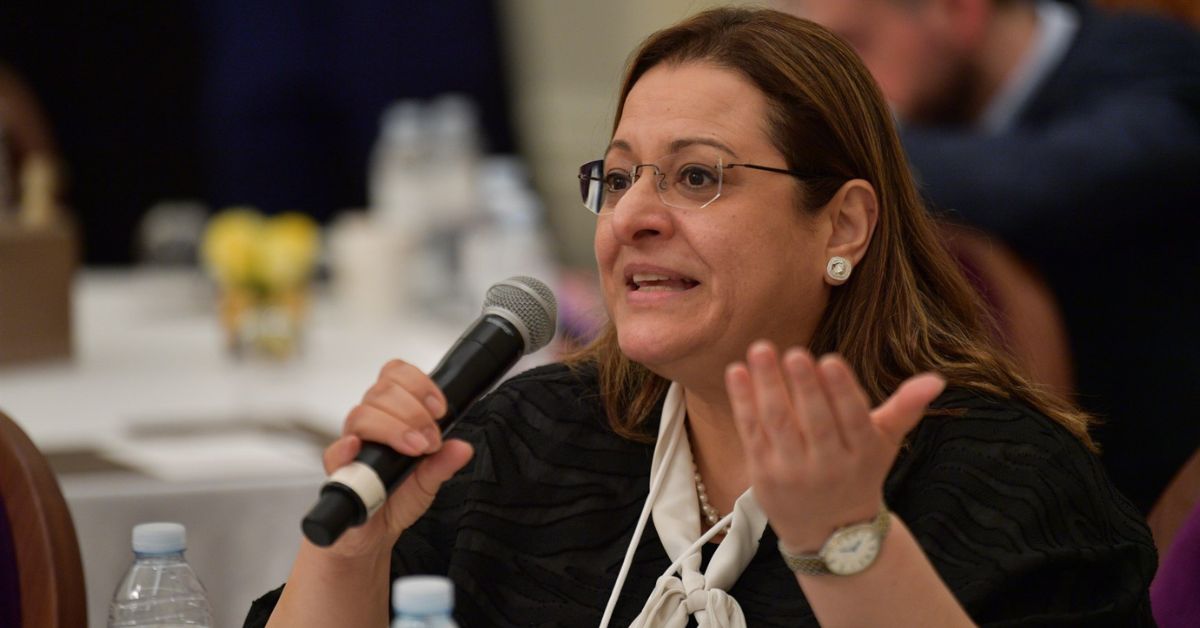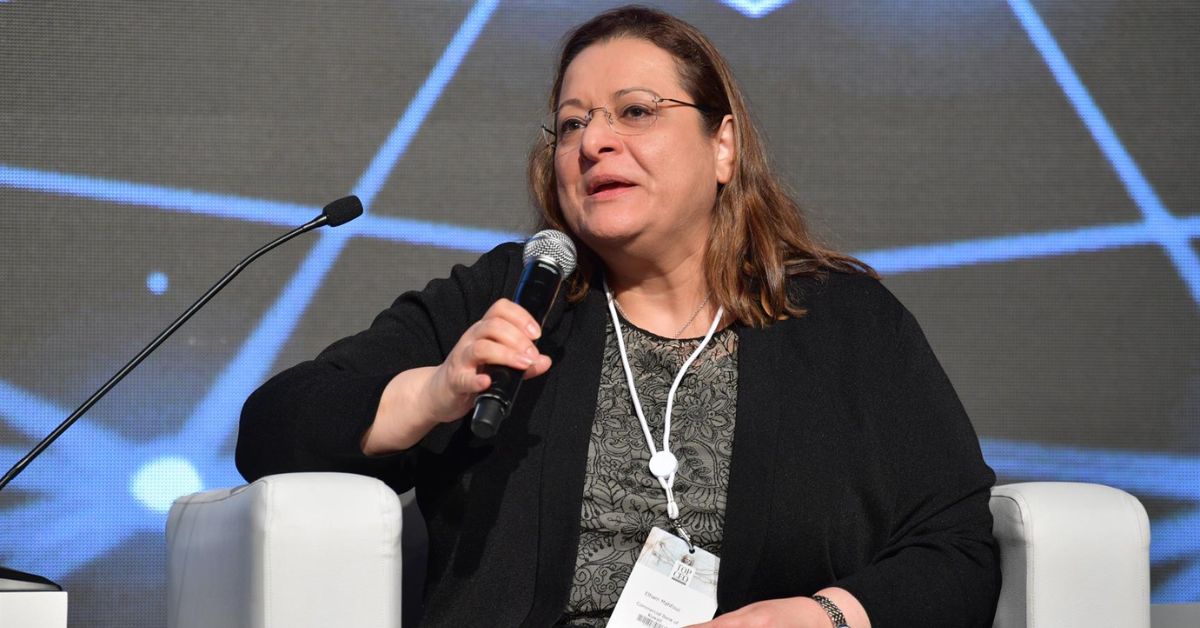KUWAIT CITY — Despite the global economic crisis, inflation, and high interest rates, the GCC banking sector has seen significant growth and development, and it is on a positive trajectory, leveraging technology and adapting to changing market dynamics.
Elham Mahfouz, CEO of Commercial Bank of Kuwait, told TRENDS that the region’s banks are strong and solid, and that they are not affected by the crisis that has hit banks in the United States and Europe. She also discussed the Kuwaiti banking sector and her expectations for 2023, as well as the risks that GCC banks are attempting to avoid, as well as the sustainability plans and issues she is concerned about in this industry.
Given the economic crisis and high interest rates, what is the current state of the region’s banking sector?
The news of what happened in the United States, such as Silicon Valley, First Republic, and the expectation of world regional banks in the United States to fall, made the government have to step in with the depositor’s fund, which is insured up to a certain amount, and that made people wonder and start asking logical questions like: what has happened? What kinds of decisions are made? What type of risk management framework do they have in place?
In Kuwait, we don’t have exposure to these banks because we don’t do business with them. If this occurred, the amount would be extremely minimal. In general, we deal with larger banks for trade, financing or participating together in big projects, big syndications, or from the banking sector’s borrowing requirements in general as banks.
So, in that regard, we can consider the impact to be non-existent in the banking sector. Following that was Credit Suisse, which was another crisis in Europe, different continents, larger in size, and well known, particularly in private banking and wealth management. Thank God, action was taken quickly to alleviate any market panic.
So, UBS stepped in quickly, and while the arrangements they made may not have been 100 percent correct in terms of having a checklist and ticking off every item, action was taken. What will happen tomorrow, and who will follow? They said, we’re working on it, we’ll be hit with $7 billion in losses in the first quarter, but that’s okay, they’ll survive, and they’ll start cleaning.
I expect that 2023 will be tougher, but the figures of the first quarter for all the Kuwaiti banks were good. So, there is something that shows that solidarity is continuing, and the business will be going on.
Commercial Bank of Kuwait CEO Elham Mahfouz
The only issue that has been reported in the newspapers, or discussed publicly or on social media, is that the staff numbers will not remain the same. Redundancies are to be expected in any normal acquisition. If you have a bank, different things will happen to cut costs and restructure the banking activities and functions within the institution.
So that’s the first part: we have connections with Credit Suisse as relationships are important. However, we do not have wealth management for the private banking business. If it is there, this bank is being taken over by UBS, another large institution, and both, of course, are large in Europe and in the country, so we shouldn’t be concerned.
On the other hand, banks benefit when interest rates rise generally. Thus, whether on the corporate or retail side, you can see that the income generators or interest income for granting loans has increased. The only issue is that central banks like the Federal Reserve believe inflation is under control because of rising interest rates. We cannot comprehend it. Looking at prices globally, I personally think they would have risen at a much higher rate than the inflation rate. So, they were able to keep the increase to a minimum or lessen the extent of the rise. But I still see people wondering about it in every country as prices have doubled and tripled.
How would you describe Kuwait’s banking sector’s performance, and what are your expectations for 2023?
Kuwait’s banking industry made a much larger profit in 2022 than it did in 2021 by 37 percent. The percentage of nonperforming loans is less than 2 percent, and it’s a very good record.
Banks have been very cautious in their lending. Whoever exposure that has been hit, whether investment companies or others, cleaning occurs immediately following the restructuring of a nonperforming loan. As a result, Kuwait’s banking sector is strong.
Central Banks in the GCC are constantly monitoring the banking sector, and I’m not saying that just to give them credit, but this is the truth. We always communicate with them, so they are always on top of what’s going on in every bank, and that is reflected in the financial figures.
In the next few years, more mergers and acquisitions are required, because the market will demand the banks to be stronger and larger in size, thus they may want to supplement themselves with another arm, either Islamic or conventional.
Commercial Bank of Kuwait CEO Elham Mahfouz
I expect that 2023 will be tougher, but the figures of the first quarter for all the Kuwaiti banks were good. So, there is something that shows that solidarity is continuing, and the business will be going on. We are expecting more projects to be coming and, in the pipeline, there are several projects that we are also working on with our customers, in addition to new customers who are also working with other banks and expanding their business. So, the business is better than we expected even after COVID-19. So, this is improving, and we hope it continues like this. For the GCC all the bank sectors I think they are in the same manner, and they have done well in a way.
In the next few years, more mergers and acquisitions are required, because the market will demand the banks to be stronger and larger in size, thus they may want to supplement themselves with another arm, either Islamic or conventional. So, I expect other banks to think the same way. When we look at the banks in the region, we see that they have grown through mergers and acquisitions.
What kind of loans are being given out by banks today, and how much do they range in amount? Is there a demand, particularly now that interest rates are so high?
We offer retail loans twice every five years, and it can be either a consumer loan, or a construction loan. The amount ranges from 2000 or 4000 KD to the maximum of 70,000 Kuwaiti Dinar, depending on the loan type and the customer’s portfolio and salary.
In the corporate loans we have too many areas such as construction, project financing trading, and SME. We also have loans for stocks or real estate, as well as loans for the oil and gas industry, in addition to bonds and investments, for example, when you buy bonds issued by banks in the UAE, Saudi Arabia, or sovereign bonds that are rated above investment grade. These loans are very important because it is diversification that gives us the return in different categories of assets.
What’s the situation with NPLs in 2023?
In general, the NPLS in Kuwait is on the lower side in the banking industry, which used to be above 2 percent or 3 but is now below 2 percent. Within our bank we implemented a policy in accordance with the recommendations made by the shareholders and the board, who asked for an NPLS view. NPLs reduce your profitability and income in the end, so you must deal with the situation immediately. It’s a little harsh, but it’s better for shareholders to see a clear picture that, yes, there may be hope for recovery.

What about startup and entrepreneur support? Are GCC banks avoiding taking risks in this field? And do you, as CBK, support them?
There is some risk, and we support entrepreneurs and startups selectively. Typically, we support customers who we are completely convinced of their plan and have provided diligence study and business expense, or startups that are an extension of a family company, so we know the family and its entire amount of the business very well. They plan to borrow a small amount to assist and support their children as they begin their business.
Making it a sort of significant component of the business in corporate lending or banking, however, is not yet happening and I don’t think it will. When you lend to startups, venture capitalists, or entrepreneurial types of companies they are the first to be wiped off when something bad happens worldwide as they need support, and they are already weak on their own. GCC banks are similarly conservative and selective. They will select the markets where they are knowledgeable and aware of what the customer is capable of. They will do it, but it won’t be as easy as opening a big door.
Artificial intelligence will eventually replace some jobs. Some jobs will no longer require humans in the future, as we can see in Japan with its robot waiters. Leaders should consider specific legislation and rules to aid in the development of skills.
Commercial Bank of Kuwait CEO Elham Mahfouz
Are GCC banks helping green businesses and in improving green economy?
The world is waking up to the importance of sustainability. I believe we felt this during COVID-19 when we were in lockdowns. Part of sustainability is taking care of your environment. For instance, our bank started using iPads instead of paper and developed a system for treating human wastewater. We also have green bonds that people can invest in. Such actions are related to social responsibility, which has always been one of our daily goals since the bank’s establishment. More will be required in the future to maintain our bank, the environment, and the global community.
Are banks prepared to make some roles redundant and the AI takes over. How are you planning to use AI to increase efficiency?
What we refer to as digitalization is regarded as artificial intelligence. We have been given three years by the Central Bank to set up two departments. One with expertise in digitization and creativity, which are components of artificial intelligence. We currently have a small department with a few of our coworkers who share their opinions with us and collaborate closely with us in the business areas.
Aside from my role as CEO, I believe that artificial intelligence will eventually replace some jobs. Some jobs will no longer require humans in the future, as we can see in Japan with its robot waiters. Leaders should consider specific legislation and rules to aid in the development of skills. The main concern I have is that people will lose their jobs, particularly future generations, unless we develop skills and update our education and requirements in the curriculum and classes so that they would be ready to fit in within the new market requirements.
As the CEO of one of Kuwait’s most reputable banks and one of the region’s top businesswomen, how would you describe the challenges you face today in this industry?
One of my concerns is whether we end the quarter with figures and profitability levels that are lower than expected. Today’s customers cannot continue to fulfill implications due to changes in market conditions and the economic situation. So, these things happen, and having less than expected profitability as well as nonperforming loans, is not easy. Add to that external factor beyond our control, such as new regulatory requirements, new bank failures, global socioeconomic situations and oil prices which affect the countries and the business cycle. Furthermore, competition is one of my concerns because I want to be at least compatible so that I can offer at least the same thing as others and gradually improve it. The market is thriving, and we must be dynamic, thus we must adapt.








